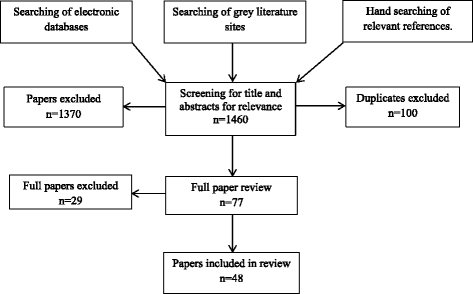Simulation and mental health outcomes: a scoping review
- PMID: 29450003
- PMCID: PMC5806484
- DOI: 10.1186/s41077-016-0035-9
Simulation and mental health outcomes: a scoping review
Abstract
Background: A scoping review was conducted in order to map and determine the gaps in literature on the impact of simulation as an educational approach to improve mental health care outcomes. As it became apparent that no literature existed on this topic, the study aimed to examine the educational impact of simulation on mental health education.
Methods: An established five-stage scoping methodology was used: (1) identification of the research question, (2) identification of relevant studies, (3) study selection, (4) charting the data and (5) collation, summarising and reporting of results. CINAHL, ProQuest, PubMed, MEDLINE, EMBASE and PsychINFO databases were searched. These databases were deemed to represent a majority of the literature while accommodating for the particular search strategy used for this review. Websites that provide grey literature were also searched for articles of relevance.
Results: A total of 48 articles were included in this review, with a considerable portion of studies conducted in the USA and UK. Others were conducted in an array of locations including Australia, Canada, Iran and Taiwan. Of the included articles, seven groups of simulation methods (including standardised patients, virtual reality and manikins as patients) were evident, with standardised patients being most prominent.
Conclusions: Literature is lacking to evidence the benefit of simulation on mental health patient outcomes. However, the available literature suggests a variety of simulation-based education, and training methods are currently being used within mental healthcare education. The findings do suggest some methods of simulation, such as the use of standardised patients, are more commonly used in education and have been deemed as effective to assist in mental health education. As no article specifically examining the mental health outcomes of patients treated by health professionals taught by simulation was identified, the educational outcomes outlined in this paper may be used to inform further research, incorporating mental health patient outcomes.
Keywords: Health occupations; Manikin; Mental health; Patient simulation; Students.
Similar articles
-
Beyond the black stump: rapid reviews of health research issues affecting regional, rural and remote Australia.Med J Aust. 2020 Dec;213 Suppl 11:S3-S32.e1. doi: 10.5694/mja2.50881. Med J Aust. 2020. PMID: 33314144
-
Student and educator experiences of maternal-child simulation-based learning: a systematic review of qualitative evidence protocol.JBI Database System Rev Implement Rep. 2015 Jan;13(1):14-26. doi: 10.11124/jbisrir-2015-1694. JBI Database System Rev Implement Rep. 2015. PMID: 26447004
-
Virtual reality simulation training for health professions trainees in gastrointestinal endoscopy.Cochrane Database Syst Rev. 2018 Aug 17;8(8):CD008237. doi: 10.1002/14651858.CD008237.pub3. Cochrane Database Syst Rev. 2018. PMID: 30117156 Free PMC article.
-
A protocol for a scoping review of the use of mental simulation and full-scale simulation in practising healthcare decision-making skills of undergraduate nursing students.Nurse Educ Pract. 2023 Aug;71:103699. doi: 10.1016/j.nepr.2023.103699. Epub 2023 Jun 30. Nurse Educ Pract. 2023. PMID: 37441918
-
Exploring the benefits and challenges of being a consumer educator in nursing education: A scoping review.J Psychiatr Ment Health Nurs. 2023 Aug;30(4):679-698. doi: 10.1111/jpm.12909. Epub 2023 Feb 21. J Psychiatr Ment Health Nurs. 2023. PMID: 36734153
Cited by
-
Educational Interventions for Nursing Students to Develop Communication Skills with Patients: A Systematic Review.Int J Environ Res Public Health. 2020 Mar 26;17(7):2241. doi: 10.3390/ijerph17072241. Int J Environ Res Public Health. 2020. PMID: 32225038 Free PMC article.
-
The use of virtual reality and augmented reality to enhance cardio-pulmonary resuscitation: a scoping review.Adv Simul (Lond). 2021 Apr 12;6(1):11. doi: 10.1186/s41077-021-00158-0. Adv Simul (Lond). 2021. PMID: 33845911 Free PMC article.
-
Simulation training in suicide risk assessment and intervention: a systematic review and meta-analysis.Med Educ Online. 2023 Dec;28(1):2199469. doi: 10.1080/10872981.2023.2199469. Med Educ Online. 2023. PMID: 37073473 Free PMC article.
-
Effectiveness of simulation in psychiatry for initial and continuing training of healthcare professionals: protocol for a systematic review.BMJ Open. 2018 Jul 11;8(7):e021012. doi: 10.1136/bmjopen-2017-021012. BMJ Open. 2018. PMID: 29997139 Free PMC article.
-
Creation and validation of a high-fidelity simulation scenario for suicide postvention.Rev Lat Am Enfermagem. 2022 Oct 17;30:e3699. doi: 10.1590/1518-8345.6034.3699. eCollection 2022. Rev Lat Am Enfermagem. 2022. PMID: 36287402 Free PMC article.
References
Publication types
LinkOut - more resources
Full Text Sources
Other Literature Sources
Research Materials


